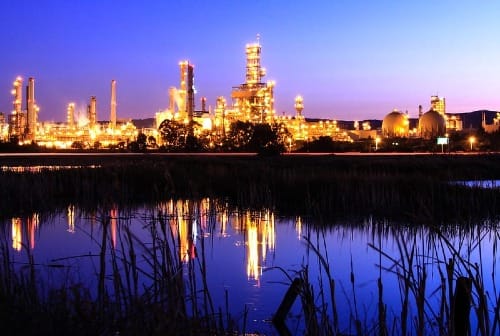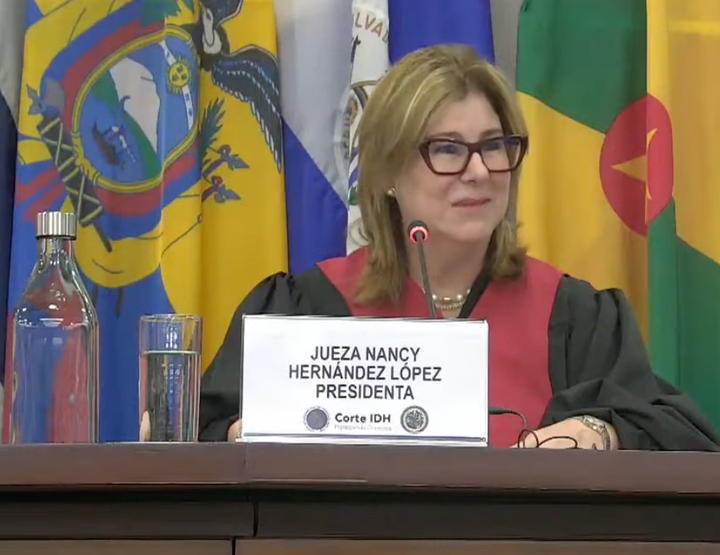Fossil Fuel Firms Face Rising Tide Of Climate Litigation – Report

New analysis finds that oil, gas and coal producers are exposed to growing litigation risk as the climate crisis worsens.
Article co-published with One Earth Now
Communities, civil society organizations and individuals around the world are increasingly taking some of the world’s largest fossil fuel companies to court in efforts to hold them accountable for their role in driving the intensifying climate crisis, and the mounting legal pressure facing these companies could pose significant financial and reputational risks, a new report suggests.
At least 86 climate lawsuits have been launched against major fossil fuel producers – including more than 40 currently active cases – and recent years have seen a surge in new filings. The number of cases filed against big oil, gas and coal producers each year has nearly tripled since 2015, the year the Paris Agreement was adopted.
That’s according to a report released today by Oil Change International and Zero Carbon Analytics titled “Big Oil in Court – The latest trends in climate litigation against fossil fuel companies.” The analysis, the authors say, is the first of its kind focusing on trends in climate lawsuits specifically targeting corporate fossil fuel producers.
“The growing number of lawsuits against fossil fuel corporations underlines how their historic and continued role in driving and profiting from climate change is catching up to them. No major oil and gas company is pledging to do the bare minimum to prevent climate chaos, so communities are taking them to court,” David Tong, industry campaign manager at Oil Change International and co-author of the new report, said in a statement.
The report builds on other research examining climate litigation trends and legal risk. A report published in June by the Grantham Research Institute on Climate Change and the Environment, the latest in a series of annual reports analyzing trends in global climate litigation, finds that that climate cases against corporate actors are on the rise.
Companies that find themselves in the crosshairs of this escalating litigation could see reductions in their financial value. A 2023 study by researchers at the Grantham Research Institute found that climate litigation can have a negative impact on corporate defendants’ stock prices. New case filings and decisions against the companies can reduce a firm’s value, especially for the carbon majors that are often the targets of this litigation. “Lenders, financial regulators, and governments should consider climate litigation risk as a relevant financial risk in a warmer future,” the researchers conclude.
Research published earlier this year, however, warns that corporate climate risk assessments do not adequately account for litigation risk, suggesting that investors are “flying blind” to potential risks from legal developments. As climate lawsuits proliferate, regulators and investors should consider the effects of litigation when assessing companies’ financial risk, the researchers argue, noting that major fossil fuel companies could be found liable for trillions of dollars. For example, the researchers from the Oxford Sustainable Law Programme estimate, using the social cost of carbon, that Chevron alone could face $8.5 trillion in liabilities for its emissions to 2010.
“Potentially these cases could be about very, very large amounts of money,” Noah Walker-Crawford, a research fellow at the Grantham Research Institute in London, said during a virtual media briefing on Tuesday discussing the “Big Oil in Court” report.
The uptick in litigation against the fossil fuel industry comes amidst increased warnings that the industry’s business model and expansion plans are incompatible with global climate goals.
UN Secretary-General António Guterres has repeatedly condemned the industry, calling its business model “inconsistent with human survival” and labeling these firms the “godfathers of climate chaos.” In a speech to the UN Human Rights Council in February 2023, Guterres endorsed the approach of taking these companies to court, saying, “Legal challenges against climate-wrecking corporations are an important step forward.”
“We’re seeing more and more efforts, from community groups and small towns to the United Nations Secretary General, to challenge the oil and gas sector’s social license. In that context, there is a huge reputational risk in investing in the companies that are driving 80 percent of the climate crisis,” Tong said.

More than half of the lawsuits against fossil fuel majors have been filed in the US, where more than two dozen cases brought by states and municipalities are currently pending. These cases allege that fossil fuel companies deceived the public about the dangers of global warming and the role of fossil fuels in causing that harm. The cases feature a variety of legal claims and approaches including cost recovery for localized climate damages, consumer fraud claims, and racketeering allegations.
While none of the cases have yet made it to trial, several of them are inching closer to that stage. A case brought by the city and county of Honolulu, for example, was cleared for trial by the Hawaii courts, but faces a challenge from oil company defendants currently pending before the US Supreme Court. “The final decision on whether the case can be heard under state law will be hugely significant in determining whether the more than 20 other lawsuits can go to trial,” the new report explains. “If one of these cases concludes the oil and gas industry is liable it would set a precedent, with particular impacts in the liability insurance market.”
There have also been increasing calls on the US Department of Justice (DOJ) to take legal action against Big Oil over its role in fueling the climate crisis and stymying efforts to address it. In May, Democratic members of Congress Sen. Sheldon Whitehouse and Rep. Jamie Raskin sent a letter to US Attorney General Merrick Garland summarizing findings of a joint congressional investigation into Big Oil and climate disinformation, and urging DOJ to take appropriate legal action to hold oil companies accountable. Last month, another letter demanding action, signed by over 10,000 citizens including more than 1,000 survivors of climate-related disasters, was delivered to DOJ.
Beyond the US, Europe has seen the second-highest number of lawsuits targeting fossil fuel companies. In the Netherlands, a court issued a historic judgment in 2021 in a case brought by Dutch environmental group Milieudefensie along with over 17,000 citizens, ordering Shell to reduce emissions across its entire supply chain by 45% by 2030. Shell has appealed the ruling and a decision from the appeals court is pending.
In Germany, the German power company RWE is facing a landmark test case brought by Peruvian farmer Saúl Luciano Lliuya seeking to hold the company partially liable for the costs associated with protecting Lliuya’s home community from flooding stemming from a nearby melting mountain glacier. The case, filed in 2015, could set a precedent if successful for litigation aiming to hold corporations accountable for their contributions to global greenhouse gas emissions and the subsequent environmental damages impacting communities especially in the Global South. “For those of us directly impacted by the climate crisis, the courts offer a glimmer of hope,” Lliuya said. “People like me are in court because our livelihoods are at serious risk and we are asking judges to hold the fossil fuel companies responsible.”
In France, several cases are pending against the French oil major Total (now called TotalEnergies), including a lawsuit brought in 2020 by French NGOs and municipalities as well as a novel criminal complaint submitted to French authorities in May by three NGOs and eight individuals who identify as victims of climate disasters. The criminal complaint also targets TotalEnergies’ board of directors and shareholders. Additionally, TotalEnergies faces a climate case in Belgium brought by a Belgian farmer in March.
According to the new report, TotalEnergies has seen more than a dozen climate legal actions brought against it since 2005. Other major oil and gas companies are facing even more cases – ExxonMobil and Shell have been targeted in 43 and 42 cases, respectively, since 2005, while BP, Chevron, and ConocoPhillips have each seen more than 25 cases filed against them in that time.
ExxonMobil, BP, and Chevron did not immediately respond to a request for comment, and Shell declined to comment. TotalEnergies did not directly address the lawsuits in its response, but instead pointed to its $5 billion investment in low-carbon energy in 2023 and 2024 and its net zero aspiration. “Our ambition is to get to net zero by 2050, together with society,” TotalEnergies spokesperson Marion Viry said in an emailed response. “Within the framework of our ambition for Net Zero 2050, together with society, TotalEnergies is committed to reducing the carbon footprint of its production, transformation and supply of energy to customers. The Company has an ambitious action plan to reduce its own greenhouse gas emissions, i.e. Scopes 1 and 2 on operated assets, to the strictest minimum.”
The new analysis also looked at the types of climate lawsuits filed against fossil fuel defendants, and finds that three types of cases have grown significantly in recent years. Cases seeking compensation for climate damages account for the largest share, 38%, of the lawsuits filed against fossil fuel companies. Cases alleging misleading advertising comprise 16% of overall cases, and lawsuits seeking to compel fossil fuel companies to reduce their emissions in line with the Paris Agreement comprise 12% of cases.
“Oil companies knew about climate change over 50 years ago and decided in the meantime to manipulate science, to lobby against climate policies, and to make us believe that they are in transition. And that's the central issue of the reduction [in] emission cases – these companies are not in transition, and their trajectories are not aligned with the targets of the Paris Agreement,” said Justine Ripoll, campaign manager with Notre Affaire à Tous, one of the French organizations that has sued TotalEnergies. She said that major fossil fuel companies have the means to lead in the energy transition, but greed seems to be standing in the way. “We think the willingness to give up making money with the very last drop of oil is currently lacking. That’s why these cases are important.”
According to the report, misleading advertising cases appear to be an effective strategy for holding fossil fuel companies accountable. Nearly all of the nine such cases concluded to date have resulted in regulators ruling against the companies or in ads being withdrawn.
Climate damages cases, meanwhile, have potential to have significant financial impacts on companies and their investors, the analysis suggests.
“The wave of lawsuits against Big Oil could lead to serious impacts on their bottom line, a disincentive for investment in fossil fuel infrastructure, a reduction in corporate value, and a challenge to their social license to continue harming communities around the world,” said Tong.
And the rising legal risk and mounting pressure is not likely to subside anytime soon.
“Fossil fuel producers are already facing increased legal risks,” Tong said. We can expect more and more climate lawsuits to be brought against the companies that are doing the most to cause the climate crisis in the years ahead.”
*Updated September 12, 2024 with oil company responses


